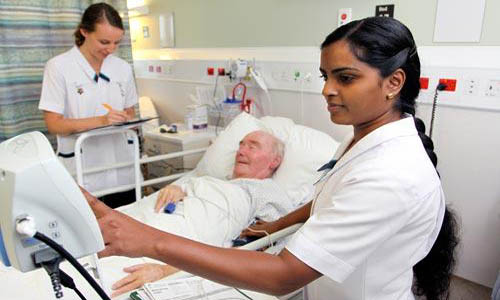
In the field of healthcare, the roles and responsibilities of registered nurses (RNs) and nurse practitioners (NPs) play a vital part in patient care. While both professions involve working closely with patients, there are distinct differences between the two in terms of education, scope of practice, and level of autonomy. This article aims to provide a comprehensive breakdown of the variances between registered nurses and nurse practitioners, shedding light on their unique contributions to the healthcare system.
The Distinctions in Education:
Registered nurses typically obtain a nursing diploma, an associate’s degree in nursing (ADN), or a bachelor’s degree in nursing (BSN) to become licensed. On the other hand, nurse practitioners pursue advanced education beyond the registered nurse level. They typically earn a master’s degree in nursing (MSN) or a Doctor of Nursing Practice (DNP). The extended education and training of nurse practitioners equip them with advanced clinical knowledge and skills.
Scope of Practice:
One significant distinction between registered nurses and nurse practitioners lies in their scope of practice. Registered nurses work under the supervision of physicians and are responsible for providing basic patient care, administering medications, monitoring vital signs, and assisting with various procedures. Nurse practitioners, on the other hand, have an expanded scope of practice. They can diagnose and treat common illnesses, prescribe medications, order diagnostic tests, and even manage chronic conditions independently.
Level of Autonomy:
Due to their advanced education and training, nurse practitioners generally enjoy a higher level of autonomy compared to registered nurses. Nurse practitioners often work in primary care settings, where they can function as primary care providers, diagnosing and treating patients without direct physician supervision. In contrast, registered nurses work collaboratively with physicians, following their instructions and assisting in patient care activities.
Job Settings:
Registered nurses and nurse practitioners work in diverse healthcare settings. Registered nurses can be found in hospitals, clinics, nursing homes, and home health agencies, providing care to patients of all ages. Nurse practitioners commonly work in primary care settings, but they can also be found in specialty clinics, hospitals, universities, and research institutions. Their advanced training allows them to specialize in areas such as family practice, pediatrics, geriatrics, or mental health.
Patient Population:
Registered nurses typically care for a wide range of patients with varying healthcare needs. They may work with infants, children, adults, or older adults, depending on their chosen specialty. Nurse practitioners, with their advanced training, often specialize in a specific patient population. For example, they may focus on providing care to children as pediatric nurse practitioners or work primarily with older adults as geriatric nurse practitioners.
Collaboration with Physicians:
Registered nurses collaborate closely with physicians, following their instructions and reporting patient conditions. They work as part of a healthcare team, assisting physicians in delivering quality care. Nurse practitioners, while also collaborating with physicians when necessary, often have more independent decision-making authority. They can diagnose, prescribe medications, and treat patients without direct physician involvement, which enables greater efficiency in primary care settings.
Salaries and Job Outlook:
The salaries of registered nurses and nurse practitioners can vary based on factors such as education, experience, geographic location, and specialty. Generally, nurse practitioners earn higher salaries compared to registered nurses due to their advanced education and expanded scope of practice. According to the Bureau of Labor Statistics, both professions are projected to experience strong job growth in the coming years, driven by the increasing demand for healthcare services.
Continuing Education:
Both registered nurses and nurse practitioners are committed to lifelong learning and continuous professional development. Continuing education is essential for staying updated with the latest advancements in healthcare and maintaining licensure. Registered nurses can pursue additional certifications and specialized training to enhance their skills. Nurse practitioners are often required to complete continuing education units to maintain their licensure and certifications.
Specializations and Certifications:
Registered nurses can choose to specialize in various areas of nursing, such as critical care, emergency nursing, or oncology, by obtaining certifications in their respective specialties. Nurse practitioners, in addition to their specialization in patient populations, can also pursue certifications in specialized areas of practice, such as acute care, family practice, or psychiatric-mental health.
Key Skills and Competencies:
Registered nurses require strong clinical skills, excellent communication abilities, empathy, and critical thinking skills to provide quality care to their patients. Nurse practitioners build upon these skills and develop advanced assessment, diagnostic, and treatment competencies. They must also possess leadership qualities, as they often serve as primary care providers and work independently within their scope of practice.
Professional Organizations:
Registered nurses and nurse practitioners can benefit from joining professional organizations that support their respective roles. Organizations such as the American Nurses Association (ANA) and the National Association of Nurse Practitioners in Women’s Health (NPWH) provide resources, networking opportunities, and advocacy for registered nurses and nurse practitioners, respectively. Membership in these organizations can help professionals stay connected, access educational opportunities, and remain updated on industry developments.
FAQs:
What are the educational requirements to become a registered nurse?
To become a registered nurse, individuals must complete a nursing diploma, an associate’s degree in nursing (ADN), or a bachelor’s degree in nursing (BSN). Once the educational requirements are fulfilled, aspiring registered nurses must pass the National Council Licensure Examination for Registered Nurses (NCLEX-RN) to obtain their license.
How long does it take to become a nurse practitioner?
The length of time required to become a nurse practitioner depends on the educational pathway chosen. Nurse practitioners typically complete a master’s degree in nursing (MSN) or a Doctor of Nursing Practice (DNP) program, which can take 2-4 years to complete. After completing the advanced degree, nurse practitioners must pass a national certification exam to become licensed.
Can nurse practitioners prescribe medications?
Yes, nurse practitioners have the authority to prescribe medications. They can prescribe medications based on their evaluation and diagnosis of patients, adhering to the regulations and guidelines set forth by their state’s nursing board.
What is the difference between a nurse practitioner and a physician assistant?
While nurse practitioners and physician assistants (PAs) have some similarities in their roles, there are notable differences. Nurse practitioners have a nursing background and often focus on patient care within their scope of practice. Physician assistants, on the other hand, have a medical background and work under the supervision of physicians, assisting in various aspects of patient care.
Can nurse practitioners open their clinics?
In many states, nurse practitioners have the authority to open their clinics and operate independently. However, the regulations regarding nurse practitioner practice vary by state. Some states may require nurse practitioners to have collaborative agreements with physicians, while others grant full practice autonomy.
How can I transition from being a registered nurse to a nurse practitioner?
To transition from being a registered nurse to a nurse practitioner, individuals need to pursue advanced education. This involves completing a master’s degree in nursing (MSN) or a Doctor of Nursing Practice (DNP) program. The specific requirements may vary depending on the program and institution of choice.
Conclusion:
In conclusion, understanding the differences between registered nurses and nurse practitioners is crucial in appreciating the unique roles they play in healthcare. While registered nurses provide essential patient care under the supervision of physicians, nurse practitioners have advanced education and training that allow them to diagnose, treat, and manage patient conditions independently. Both professions contribute significantly to the delivery of high-quality healthcare, ensuring the well-being of patients across various settings and populations.
As the world of healthcare continues to evolve, nurses around the world are happily enjoying a lucrative and stable career. Over the next several decades trained nurses will become increasingly in demand, which means those that choose this field will have many options before them.
Nursing is more than just a profession, it is a vocation to commit to the overall care of a person’s health and well being. Unlike doctors who merely look to addressing the disease itself, nurses go beyond this task by ensuring that the patients stay healthy, comfortable, and well cared for during their entire hospital stay.
As the demand for and role of nurses continue to expand, we now see a wide array of specialties running from Registered Nurses to Nursing Practitioners and many of us are confused on how one differs from the other. We at onlinenursingdegrees.org will help break each down.
1. Registered Nurses (RN)
Definition:
RNs are medical professionals who have completed either a 2 or 4 year degree course in nursing. In order to qualify as registered nurses, they have to pass the NCLEX-RN (National Council Licensure Examination-Registered Nurse exam) to earn their certification. This licensure exam is also meant to test and evaluate their level of skills, knowledge, and competence.
Job Description:
Registered nurses are employed in hospitals, health institutions, and medical offices to organize and systematize patient care. In general, their scope of work includes evaluating the patient’s medical history, performing diagnostic exams, analyzing symptoms and results, operating certain equipment, administering medication, and helping both the patients and their families effectively understand and manage the disease or injury.
Salary:
A registered nurse is paid anywhere from $50,000 – $70,000 annually.
2. Nurse Practitioners (NP)
Definition:
Nursing Practitioners (NP) are actually Registered Nurses (RN) who have furthered their education and training which gives them right to diagnose and administer treatments for specific health concerns.
After qualifying as an RN, you can advance your career by undertaking 2 more years of NP training along with a degree level qualification and medical internship in various medical fields. After acquiring the necessary certifications, NPs are able to broaden their role to include diagnostics and treatment administration.
Job Description:
NPs are generally delegated the role of diagnosing the patient as well as evaluating and carrying out diagnostic tests and physical examinations. With this advance training, nurse practitioners are likewise allowed to carry out certain medical procedures depending on his specific specialties.
Salary:
Nurse Practitioners are raking in an average salary that is estimated at $80,000 – $90,000 per year.
For those considering a nursing education, it is important that you take the time to understand the different specialties available to you during your career in healthcare. The RN and NP are just 2 of several options that you can pick from in this industry. The most important thing is to find an area you are passionate about. There are several online programs that allow you to balance your training with work and family life, so those who are ready to become nurses have the flexibility to start a new career path today.





